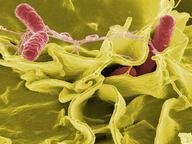Quiz Answer Key and Fun Facts
1. Bacteria in unpasteurised milk, raw or undercooked eggs and meat causes this illness, often called food poisoning
2. Caused by a virus which spreads easily between people particularly those in confined places like hospitals or cruise ships
3. Bacteria in the Vibrio genus found in contaminated water or in seafood taken from such waters cause this disease
4. Clostridium bacteria found in soil produce toxins which can cause paralysis starting from the head downwards
5. Caused by a microscopic parasite which is passed to humans by contaminated food or water
6. This bacterial infection is named for a famous scientist and is often found in unpasteurised soft cheese
7. A parasitic infection, this can be caused by eating contaminated meat but is more commonly spread by contact with faeces from infected cats
8. This bacterial infection causes a fever and constipation in its early stages and is passed on in water and food which are contaminated
9. Parasitic disease caused by contaminated water and also known as Guinea worm disease
10. Caused by a virus found in contaminated water but rare in the Western world due to vaccines developed by Salk and Sabin
Source: Author
rossian
This quiz was reviewed by FunTrivia editor
agony before going online.
Any errors found in FunTrivia content are routinely corrected through our feedback system.
